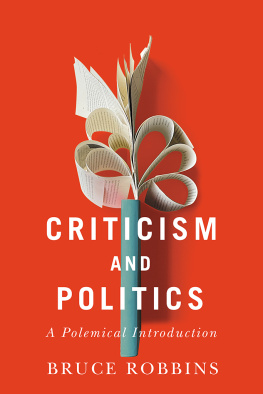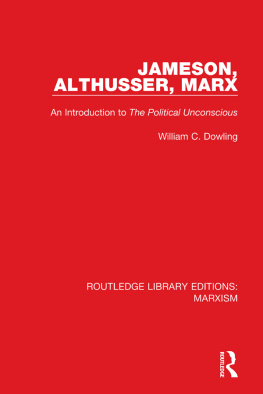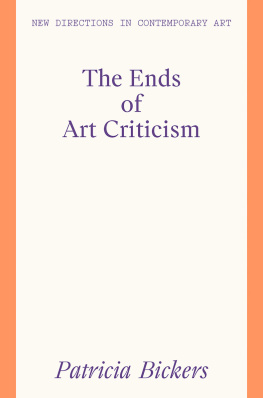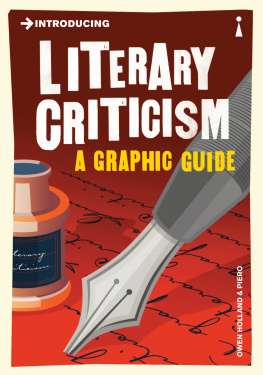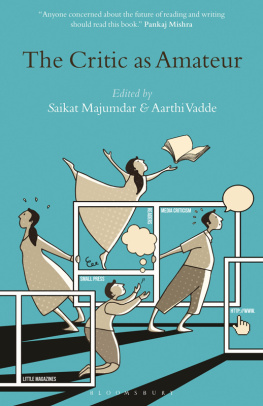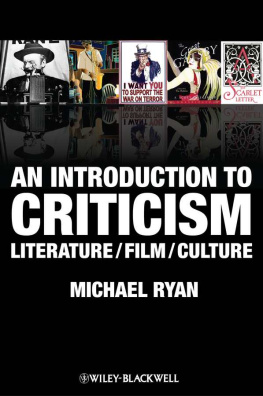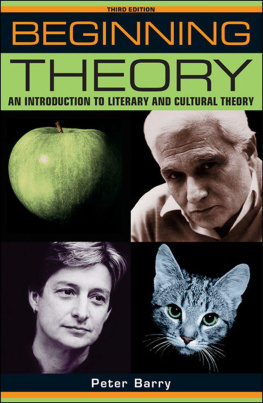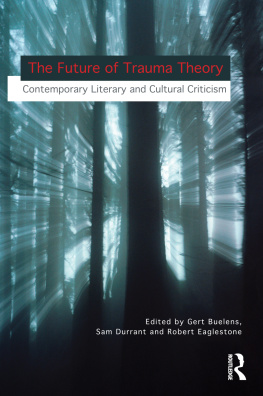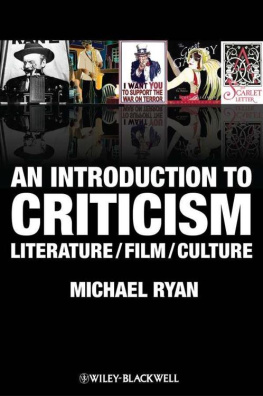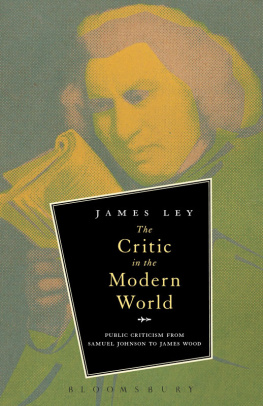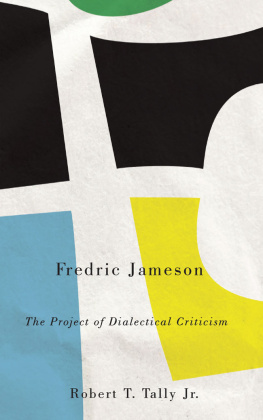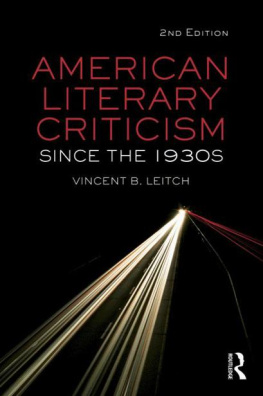CRITICISM AND POLITICS
A Polemical Introduction
Bruce Robbins
Stanford University Press
Stanford, California
Stanford University Press
Stanford, California
2022 by Bruce Robbins. All rights reserved.
No part of this book may be reproduced or transmitted in any form or by any means, electronic or mechanical, including photocopying and recording, or in any information storage or retrieval system without the prior written permission of Stanford University Press.
Printed in the United States of America on acid-free, archival-quality paper
Library of Congress Cataloging-in-Publication Data
Names: Robbins, Bruce, author.
Title: Criticism and politics : a polemical introduction / Bruce Robbins.
Description: Stanford, California : Stanford University Press, 2022. | Includes bibliographical references and index.
Identifiers: LCCN 2021056592 (print) | LCCN 2021056593 (ebook) | ISBN 9781503630192 (cloth) | ISBN 9781503633209 (paperback) | ISBN 9781503633216 (ebook)
Subjects: LCSH: Criticism (Philosophy) | CulturePhilosophy. | Politics and culture.
Classification: LCC B809.3 .R63 2022 (print) | LCC B809.3 (ebook) | DDC 142dc23/eng/20220125
LC record available at https://lccn.loc.gov/2021056592
LC ebook record available at https://lccn.loc.gov/2021056593
Contents
Introduction
What does it mean to call yourself nonpolitical, as Thomas Mann does in the title of his Reflections of a Nonpolitical Man? It might mean a desire to stay neutral when all around you are choosing sides, perhaps too hastily. It might indicate a desire not to be reductive in judging the wild, weird profusion of things that knock at the doors of your perception. It might come out of a wish to preserve politics itself as a meaningful category at a time when the category seems to be expanding too explosively in all directions. According to the New York Times of October 28, 2021,
You talk to older people and theyre like, Dude we sell tomato sauce, we dont sell politics, said Mr. Kennedy, co-founder of Plant People, a certified B corporation. Then you have younger people being like, These are political tomatoes. This is political tomato sauce.
Lately the impulse to describe oneself as nonpolitical has perhaps become more attractive because of the much-discussed polarization of the US electorate. The idea that politics is ugly and sordidsomething that entails giving oneself over to uncritical partisanship, forsaking nuance, conforming to a with-us-or-against-us crudeness of thought and feeling, and soiling oneself with unsavory moral compromisemay help explain the republication of Manns World War Iera volume. For years Reflections was not readily available, as I discovered while trying to get ahold of a copy during the global pandemic and closed libraries when I was trying to write this book. Now I
As it turns out, Reflections was unavailable for so long because it is unreadable. It is not a piece of juveniliaMann was thirty-nine when he began writing it and already a well-established writerbut he himself became embarrassed by the positions he took in it and by the over-the-top way he took them. He did not encourage the books translation into English. As Mark Lilla observes in his introduction to the New York Review Books edition, Most readers today will find the reactionary political views he expressed in it repellent, as Mann himself eventually did. Whatever nonpolitical means, its not the word that comes to mind if you consider what Mann is doing here.
Nonpolitical is unpolitisch in the original German. It might be better translated as apolitical or simply unpolitical, words that are used much more often in English and are thus more likely to strike a chord, one way or the other, in English-language readers. At any rate, while marching under the nonpolitical banner, Mann did indeed express political views, and to call those views reactionary is something of an understatement. He wrote Reflections during World War I, and he did so out of passionate support for Germany, accompanied by a palpable enthusiasm for bloodletting as such. The outbreak of the war had filled him with excitement, as if confirming his sense (shared with other artists and intellectuals of the time) that life could no longer go on in its pathetic, familiar triviality, so really, why not go to war? In a letter to his brother Heinrich, quoted in Lillas introduction, Mann says, in August of 1914, that we should be grateful for the chance to experience the mighty things that the war will bring. Europe, he proclaimed, needed a catastrophe. Channeling Nietzsche in his reactionary content as well as in his high ranting style, he opined that Europe had too much civilization, meaning too much enlightenment, too much reason, too much democracy. Here you can see the logic of him calling himself unpolitisch. In his eyes democracy politicized everything, and that was a disaster. War, the bloodier the better, was a cathartic escape both from civilization and from politics.
Manns enthusiasm for cathartic violence is not currently in vogue. Why then republish his Reflections, and in an attractive edition that is clearly not just meant for academics with an interest in the darker corners of intellectual history? To judge from Lillas introduction, the answer would seem to lie in a second term that, like war, Mann also set in opposition to politics. He opposed politics to culture. Culture, for Mann, was what Germany was
Mann wrote at a time, like our own, Lilla says, when artists were under great pressure to declare their political allegiance and shape their work accordingly.
It would be foolhardy to dispute the value of inner distance. Had there been more inner distance in 1914distance from the most demanding causes and programs of the year, perhaps even enough to resist the clamorous appeals to patriotism and the life-threatening penalties that accompanied those appealsthe massive and meaningless slaughter of World War I might have been avoided, and with it, perhaps, the bigger and even badder war that followed. But producing that sort of distance from the nations demand for violence would have had to be a political achievement, a result of the shared recognition that there were sides to be taken other than national ones, sides directly opposed to the national ones. It would have been a result of both detachment (from patriotism at home) and attachment elsewherefor example, the solidarity across national borders that very nearly stopped organized French and German workers from lending their support to the war in which so many of them were to die at each others hands. It does not go without saying that distance and ambiguity, culture and art should be opposed to politics. It is a sign of the times, however, that this opposition is once again in play.
I have a certain sympathy for cultural critics who register a friction and even an incompatibility between culture and politics. Anyone who has taught the genre of the political novel, as I have, will have noticed how uncomfortable even the genres classics are with politicshow eager Turgenev is in Fathers and Sons to pull his favorite characters clear of it and see them in some other, more personal light, how often Conrad in Nostromo condemns it as a dirty business. There is nothing uncharacteristic about Emilia Goulds view in that novel that the constant savings of the country are a puerile and bloodthirsty game of murder and rapine played with terrible earnestness by depraved children. The imperative to be politically engaged is not usually the moral of the story. Even Albert Camuss

